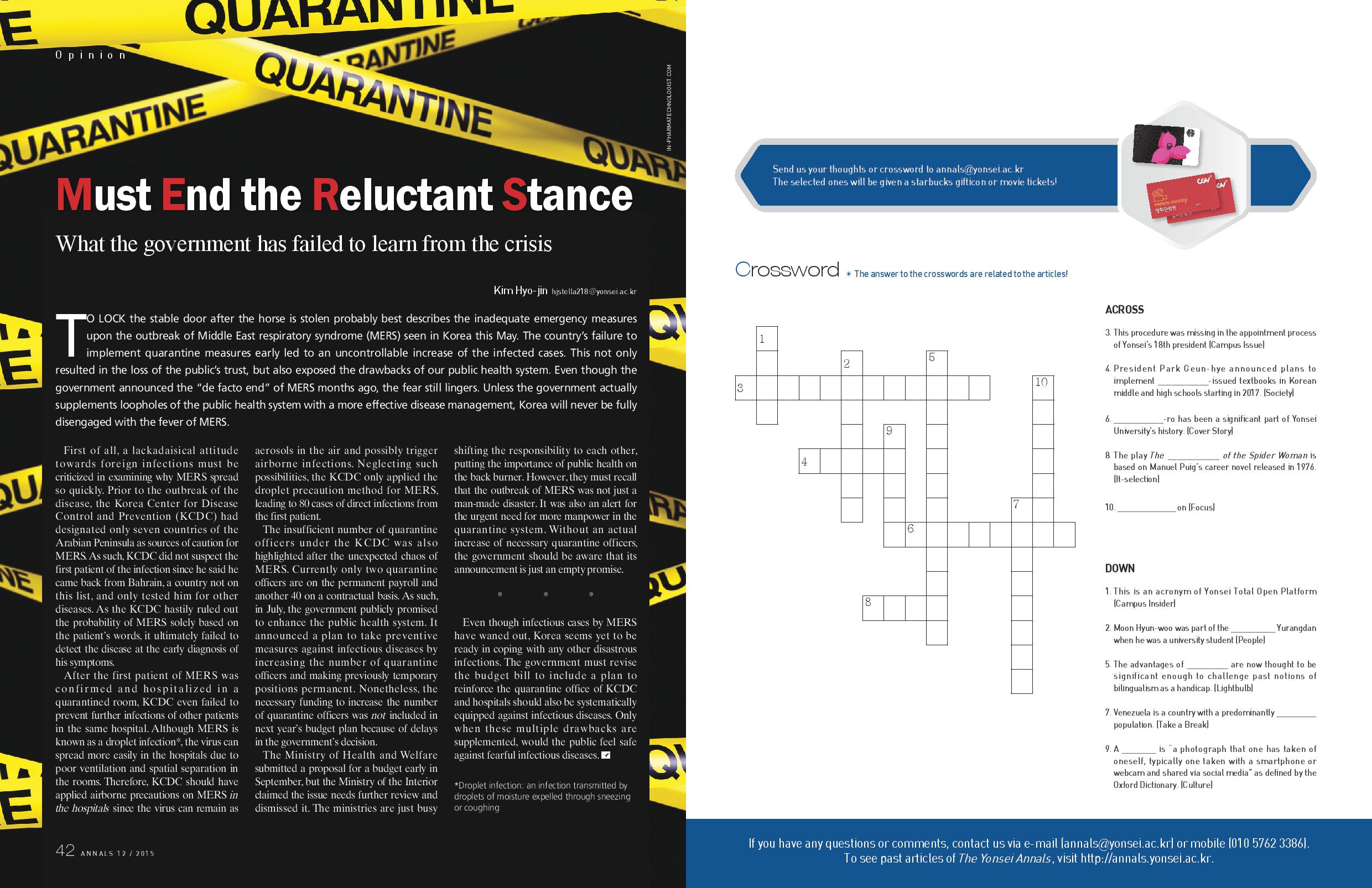What the government has failed to learn from the crisis
 | ||
TO LOCK the stable door after the horse is stolen probably best describes the inadequate emergency measures upon the outbreak of Middle East respiratory syndrome (MERS) seen in Korea this May. The country’s failure to implement quarantine measures early led to an uncontrollable increase of the infected cases. This not only resulted in the loss of the public’s trust, but also exposed the drawbacks of our public health system. Even though the government announced the “de facto end” of MERS months ago, the fear still lingers. Unless the government actually supplements loopholes of the public health system with a more effective disease management, Korea will never be fully disengaged with the fever of MERS.
First of all, a lackadaisical attitude towards foreign infections must be criticized in examining why MERS spread so quickly. Prior to the outbreak of the disease, the Korea Center for Disease Control and Prevention (KCDC) had designated only seven countries of the Arabian Peninsula as sources of caution for MERS. As such, KCDC did not suspect the first patient of the infection since he said he come back from Bahrain, a country not on this list, and only tested him for other diseases. As the KCDC hastily ruled out the probability of MERS solely based on the patient’s words, it ultimately failed to detect the disease at the early diagnosis of his symptoms.
After the first patient of MERS was confirmed and hospitalized in a quarantined room, KCDC even failed to prevent further infections of other patients in the same hospital. Although MERS is known as a droplet infection*, the virus can spread more easily in the hospitals due to poor ventilation and spatial separation in the rooms. Therefore, KCDC should have applied airborne precautions on MERS in the hospitals since the virus can remain as aerosols in the air and possibly trigger airborne infections. Neglecting such possibilities, the KCDC only applied the droplet precaution method for MERS, leading to 80 cases of direct infections from the first patient.
The insufficient number of quarantine officers under the KCDC was also highlighted after the unexpected chaos of MERS. Currently only two quarantine officers are on the permanent payroll and another 40 on a contractual basis. As such, in July, the government publicly promised to enhance the public health system. It announced a plan to take preventive measures against infectious diseases by increasing the number of quarantine officers and making previously temporary positions permanent. Nonetheless, the necessary funding to increase the number of quarantine officers was not included in next year’s budget plan because of delays in the government’s decision.
The Ministry of Health and Welfare submitted a proposal for a budget early in September, but the Ministry of the Interior claimed the issue needs further review and dismissed it. The ministries are just busy shifting the responsibility to each other, putting the importance of public health on the back burner. However, they must recall that the outbreak of MERS was not just a man-made disaster. It was also an alert for the urgent need for more manpower in the quarantine system. Without an actual increase of necessary quarantine officers, the government should be aware that its announcement is just an empty promise.
Even though infectious cases by MERS have waned out, Korea seems yet to be ready in coping with any other disastrous infections. The government must revise the budget bill to include a plan to reinforce the quarantine office of KCDC and hospitals should also be systematically equipped against infectious diseases. Only when these multiple drawbacks are supplemented, would the public feel safe against fearful infectious diseases.
*Droplet infection: an infection transmitted by droplets of moisture expelled through sneezing or coughing
Kim Hyo-jin
hjstella218@yonsei.ac.kr

